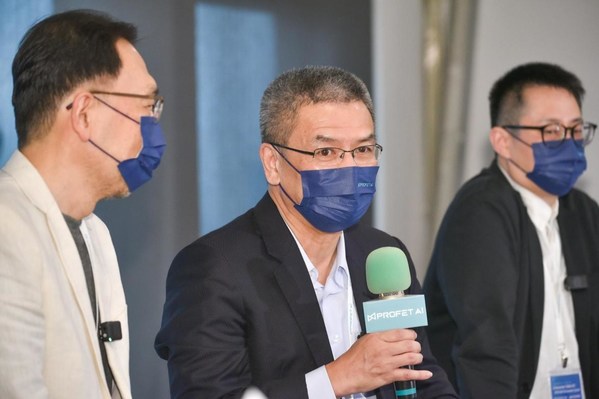TAIPEI, Dec. 2, 2022 /PRNewswire/ -- With alarms sounding about a global recession, the upcoming challenges will test the resilience of enterprises and the wisdom of the structure of the future market. David Huang, Founder of Jensen Capital, together with many industry and academic experts from School of Interdisciplinary Design of Feng Chia University, AUO, Gogoro, Cheng Hsin Rubber, and Taiwan AI Academy, advised companies to value the power of AI data and tools, strengthen industry domain knowledge, and cooperate cross-organizationally. The experts noted that business leaders should make the right decisions, enter the market in crisis, and deploy in advance so they can become winners when the economy recovers.

David Huang, Founder of Jensen Capital, suggested that leaders should believe in the economic cycle and deploy AI early.
As the world is counting down to 2023, major international institutions are forecasting the global economy next year to be bleak. The International Monetary Fund (IMF) even points out that economic growth in 2023 may continue to be revised down to below 1%. Recently, the Taiwan Institute of Economics revised Taiwan's economic growth rate in 2023 down to 2.91%. Facing global headwinds, business leaders are eager to find strategies to break out. Profet AI, the leading provider of AI platforms for the manufacturing industry, recently held a forum in Taichung, "Crossover Talks: AI & Economic Cycles." The event invited Founder of Jensen Capital David Huang, Dean of School of Interdisciplinary Design of Feng Chia University Peter J. Sher, Executive Vice President of AUO Digitech Shinmin Chao, Manufacturing Director of Gogoro Taiwan Limited Charlie Huang, Information Center Manager of Cheng Shin Rubber Justin Chen, and Director of Industry Development of Taiwan AI Academy Benjamin Kuo to share their experiences with all attendees and brainstorm ideas for beneficial solutions.
Believing in the economic cycle and cultivating excellent leader perspectives: see the crisis as an opportunity
David Huang said that a quarter of a century after the last financial tsunami, another wave of recession will be coming. Corporate leaders should trust the economic cycle, and a market downturn is the best time for companies to improve their personnel, machines, raw materials, methods, and environmental quality. David Huang shared his experience of leading the Yageo Corporation through the financial tsunami in 2008. He took the inverse action during the downturn, investing boldly in equipment procurement at lower prices and mobilizing manpower so that he was able to quickly obtain business opportunities when the economy recovered and achieved success.
According to David Huang, AI applications are one of the best choices for investment during the current downturn. Good leaders must see the big picture, and to do that, they must rely on trustworthy intelligence. He suggested that leaders must adopt the right attitude when deploying AI and use AI combined with data and domain knowledge to produce intelligence information. These actions, he said, will ensure sustainable business operation through AI applications.
David Huang, Founder of Jensen Capital, suggested that leaders should believe in the economic cycle and deploy AI early.
Strengthening domain knowledge through AI tools that support the lifeline of enterprises
Sher of Feng Chia University also discussed his observations on the deployment of AI, highlighting AUO and enterprises mentored by the School of Interdisciplinary Design. He pointed out that AI is not a glamorous term. He noted that enterprises should not expect AI to be deployed with a single action, but deployment actually involves detailed workflow and requires cross-departmental and cross-disciplinary communication and coordination to effectively integrate resources.
Chao of AUO Digitech said that AUO personnel's high awareness of AI and process improvement has helped the company become a model student of AI applications. AUO has assigned more than 1,000 personnel to related training over 5 years. AI has long been in AUO's DNA, and only in this way can it successfully reduce labor costs, increase output, and elevate productivity by 30%.
The panelists discussed that, although using computing and algorithms will help leaders to successfully deploy AI, the key to victory is actually domain knowledge. Charlie Huang of Gogoro shared his professional manufacturing experience across machinery, aerospace engineering, and semiconductor industries, emphasizing that companies must focus on profunding domain knowledge while professional partners are best able to deploy tools and applications. Kuo of Taiwan AI Academy also mentioned that, in the current geopolitical situation, everyone's role is interchangeable, so the only way for companies to remain invincible is to continuously improve their domain profession.
Using AI data as a teacher
Under the current trend of second-generation succession, smoothly taking over and breaking new ground are essential topics for many new-generation successors. Chen of Cheng Shin Rubber added that a common problem his company encountered was convincing the previous business owners to deploy new technology and methods to improve business efficiency. He said that, for traditional industries, more than 95% of companies don't understand AI, and they don't know how many resources to invest in it or how to start. Under Chen's leadership, Cheng Shin Rubber quickly deployed Profet AI platforms, effectively improving the yield rate, reducing test time and quantity scrapped, and decreasing development costs at the same time. With fast and sensible actual data as evidence, second-generation successors can win the trust of first-generation leaders.
David Huang indicated that first-generation leaders rely on time and money to accumulate experience, while second-generation top managers focus on respect and using the power of data to run sustainable businesses. Kuo suggested companies should treat data as a daily routine to realize digital optimization and strengthen competitiveness with AI.
Crossover Talks: AI & the Economic Cycle Series Event to be held in Kaohsiung
Profet AI CEO Jerry Huang expressed that Profet AI has focused on the manufacturing industry for a long time and, thus, understands the pain points of customers that are facing the current international situation and market challenges and are trying to figure out how to implement AI applications. This year, Profet AI started hosting "Crossover Talks: AI & the Economic Cycle," a series of forums, hoping to find solutions by brainstorming with industry and academic experts and enterprises. The next forum will be held in Kaohsiung on December 8, and Profet AI welcomes corporate friends to join!










